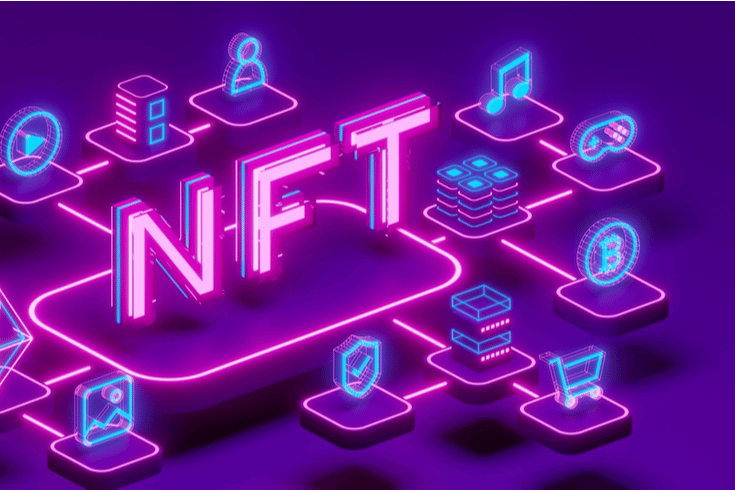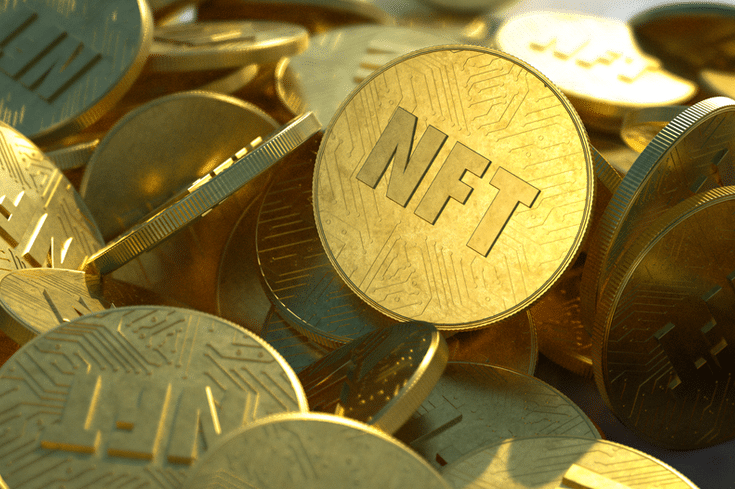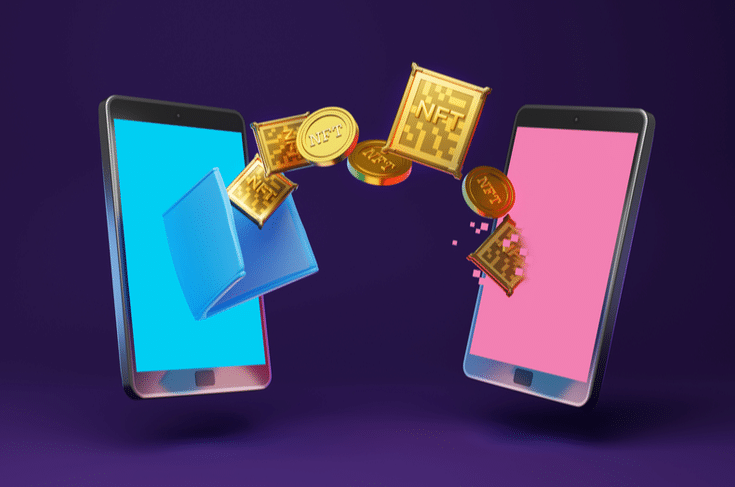Legal Regulations for NFTs in Japan

Non-Fungible Tokens (NFTs), which create “one-of-a-kind” digital assets to represent ownership of unique items, are used in areas such as digital art, blockchain game items, and trading cards. Aside from gaming, NFTs have been put to actual use as proof of ownership of real property, such as real estate, and membership symbols to achieve special status in the real world.
NFTs are subject to complex laws and regulations depending on how they are issued, how they are used as a means of payment, whether they can be exchanged for other tokens, and what they symbolize. In other words, there are cases where the same NFT may be subject to different laws and regulations depending on individual circumstances.
In this article, we will explain the nature of NFTs as well as the relevant laws.
NFT (Non-Fungible Token) Characteristics
NFT stands for “Non-Fungible Token” and is an irreplaceable token built primarily on the Ethereum blockchain.
NFT is a “non-fungible” and unique token issued using digital blockchains. Since each token is unique and distinguishable from others, it is used when “representing” digital data and can be easily duplicated. copies, therefore representing its rarity and original value.
Although these codes are impossible to duplicate, because they are:
- managed by decentralized blockchain; and
- are able to be transferred and traded,
its properties are very similar to those of blockchains. Due to these characteristics, NFTs are anticipated to be utilized across different fields including blockchain games, digital art, real estate, memberships, etc.
How are these NFTs legally treated and under what regulations? Although this may be complicated as systematic parts of NFTs are involved, we will explain the relationship between relevant laws and NFTs.
Do NFTs fall under Crypto Assets?

Definition of Crypto Assets in a Legal Aspect
There are two types of legal crypto assets: “Type 1” and “Type 2”. Crypto Currencies that fall into either of these categories are legal crypto currencies.
To begin, for a crypto asset to be classified as “Type 1,” it must satisfy all of the following conditions:
- can be used for unspecified persons as a payment for purchasing goods or providing services;
- a property value that can be bought and sold to an unspecified person; and
- can be transferred using an electronic information processing system
A typical example would be Bitcoin as it satisfies all three previous conditions:
- bitcoin can be used as a “currency” at various locations as a means of payment when buying and selling;
- you can buy and sell Bitcoin against other users around the world on the exchange; and
- bitcoin can be exchanged and tracked in the blockchain.
Therefore, it falls under Type 1 crypto assets.
Tokens that do not meet any of the three conditions mentioned above, yet can be exchanged for Type 1 crypto-assets fall under “Type 2 crypto-assets.”
Businesses that carry out activities falling under any of the aforementioned items are subject to regulations as crypto asset exchange businesses under the Payment Services Act.
Regulations on Crypto Asset Exchange Businesses under the Payment Services Act
If NFTs cannot be used as a means of payment, it does not satisfy the conditions for it to be considered Type 1 crypto assets. However, regarding its correlation with Type 2 crypto assets, the Financial Services Agency released its decision after receiving backlash on the the organization’s partial revision of the “Administrative Guidelines (Volume 3: Financial Companies).” The FSA disclosed its opinion that NFTs that do not hold economic functions such as payment methods, do not fall under Type 2 Crypto Assets.
The Financial Services Agency stated in the same comment that:
Even if the asset cannot be used directly for the purchase of goods, etc. or be exchanged for legal currency, in cases where the asset can be utilized as payment methods or mutually exchanged for Type 1 crypto assets, it is considered that such assets will be included in the Type 2 crypto asset category under the Payment Services Act. Therefore, for example, trading cards, in-game items, etc. recorded on blockchains which can be exchanged for Type 1 crypto assets, can not be considered Type 2 crypto assets as they do not hold economically viable payment methods like Type 1 crypto assets. Therefore, these assets do not fall under Type 2 crypto assets.
To summarize, the regulation on “crypto assets” was established because tokens that have economic functions such as payment methods must be regulated due to their nature. Even if the token itself does not hold an economic function, if it has an economic function through another token, regulation is necessary in the same way as (1).
The purpose of the legal regulation is to define and regulate tokens with functions from (2) as “Type 2 crypto assets.”
Therefore, “trading cards, in-game items , etc. recorded on blockchains” do not fall under “Type 2 crypto assets” unless they have economic functions.
Collective Investment Schemes and Crypto Currencies under the FIEA
However, whether a particular NFT has an “economic function” depends on the content of the NFT, the business scheme of the issuing company, and particular circumstances.
This is because, there may be cases where, for instance, the NFT of a rare item in a blockchain game,
- can be used as currency in another blockchain game; and
- can be used as currency within another marketplace.
Hence, if the company that manages the original game that issued the NFT of the item is involved in the provision of the other blockchain game or marketplace, the original game will be required to manage the NFT as a crypto currency.
In addition, if a third party unrelated to the game operator that issued the NFT of the item, manages the other blockchain game and marketplace, the original game itself does not need to manage the NFT as a crypto asset. There is an issue as to whether the third party company will need to manage the NFT as a crypto asset.
Are NFTs categorized as prepaid payment instruments?
What are “prepaid payment instruments” stipulated by the Payment Services Act?
Some NFTs may be prepaid payment instruments, even if they are not crypto assets.
Prepaid payment instruments:
- have its property values described and recorded;
- which are issued at equal value; and
- can be used as payment for purchasing goods or providing services.
In principle, monetary refunds are prohibited. A typical example is gift certificates for department stores.
Regarding the similarities and differences between crypto assets and prepaid payment instruments, although both are used as payment for purchasing goods and providing services
- Crypto assets: Can be used by unspecified persons,
- Prepaid payment instruments: available for specific persons
such a distinction is important.
Relationship between NFT and “prepaid payment instruments”
NFTs are non-substitutable, cannot be used to purchase goods or provide services, and generally do not fall under prepaid payment instruments.
However, in the case of NFTs for items in blockchain games, for example, there may be cases where such NFTs can be used as payment for the purchase of other items or other goods in other blockchain games or external marketplaces with crypto assets, the question arises as to whether the third party operating the other game or external marketplace needs to manage the NFT as a prepaid means of payment.
Are NFT transactions considered exchange transactions?

What is “Exchange Transaction” under the Banking Act?
According to Japanese law, fund exchange transactions are classified as part of the banking industry and require registration with the Prime Minister. This process is mandatory. Despite the fact that there is no specific description in the Banking Law, the Fund Settlement Law, or other associated legislation, this scheme exists. The following is an earlier ruling of the Supreme Court in this matter:
“Transferring exchange transactions” means receiving and satisfying a request from a customer to transfer funds using a mechanism that does not directly transport cash between remote parties.
Supreme Court Decision March 12, 2001.
What are the commonalities and differences between this “exchange transaction” and “prepaid payment instruments?” With the relationship between NFT, while they are both used for purchasing goods and services, the following distinction is important.
- Prepaid Payment Instruments: Refunds Prohibited; and
- Exchange transactions (tokens used as means): refunds are possible (rather expected to be refunded)
The relationship between NFT transactions and exchange transactions
If the tokens are freely transferable and reimbursable in the case of NFT transactions, it would also be possible to use the tokens to transfer funds without transporting cash directly between separating parties.
In general, NFTs representing digital art, etc., do not have a fixed price and it is difficult to construct a system as described above; for each case.
The relationship between Free-Issued NFTs and ‘Points’
We will examine whether NFTs distributed at no cost can be classified as “points.”
Points given as a complimentary benefit when purchasing products or services do not fall under the category of prepaid payment instruments, as they do not fulfill the requirement of being “issued for consideration”. Additionally, there are no specific laws or regulations regarding these points. An example of such points is the ones provided by home appliance retailers.
However, with regards to the notion of “free of charge”, if points are given out in exchange for prepaid payment instruments such as tokens that are issued for a fee, then the original prepaid payment instruments are deemed to have been charged. Tokens will also be charged and considered as prepaid payment instruments.
In regard to NFTs, it is possible to consider the handling of “points” that are given as a “bonus” for the purchase of other products at no cost.
If tokens issued in this manner can be traded for Type 1 crypto assets like Bitcoin on marketplaces, then even tokens distributed for free may also be classified as Type 2 crypto assets.
When tokens are distributed as “gifts” to users who fulfill specific conditions like in blockchain games, it may trigger concerns regarding the Premiums and Representations Act that regulates “premiums” given away for free.
Do NFTs fall under electronic record transfer rights?
If NFTs are regarded as a form of a right, specifically the right to receive a portion of business revenue, they may be classified as securities under the Financial Instruments and Exchange Act (FIEA). This rises the question of whether the right to transfer records is applicable, unlike cases where NFTs are utilized as representations of digital art or in-game blockchain assets.
Electronic record transfer rights refer to the rights that are intended to distribute business profits to their holders and are represented by the property value that can be transferred via an electronic information processing system. Traditional securities, such as stock certificates and corporate bonds, are not considered electronic record transfer rights. These are token-denominated single-term securities and are subject to similar regulations under the FIEA.
When dealing with electronic record transfer rights for token-denominated single-item securities, one is required to comply with stringent laws and regulations such as registering as a financial instruments business and meeting disclosure obligations for trading or offering them.
These NFTs are typically not intended for use in digital art or blockchain game items. Evaluate whether the original NFT qualifies as a security.
If an asset does not fall under securities (electronic record transfer rights), then its applicability to crypto assets becomes a matter of concern.
Hence, NFTs falling under the electronic record transfer rights category are considered as electronic record transfer rights, irrespective of whether they satisfy the criteria for crypto assets.
NFT Business and Legal Regulations
As mentioned above, there are many questions surrounding the use of NFTs in Japan, such as:
- Can it be used as a means of payment?
- Is a monetary refund possible?
- Is there a fee associated with it?
- Can I receive a share of the business revenue if I own an NFT?
In order to legally conduct a business that utilizes NFTs, it is necessary to accurately understand the scheme of the business, correctly analyze legal issues, and consider specific issues. It is important to consult a lawyer who understands both the business and legal side of blockchain technology.
Guidance from our office
Monolith Law Office is a legal firm that specializes in handling legal affairs related to crypto assets and blockchains, operating since 2017. Our work involves learning foreign policy documents to understand schemes, researching the legality of implementing the project in Japan, proposing improvement plans for legal implementation, creating contracts based on policy documents, and more. Such work requires extensive knowledge, experience, and know-how related to IT, English, business, financial laws, and other legal matters. We offer comprehensive support for businesses involved in crypto assets and blockchains through the collaboration of lawyers and IT consultants.
Category: IT





















